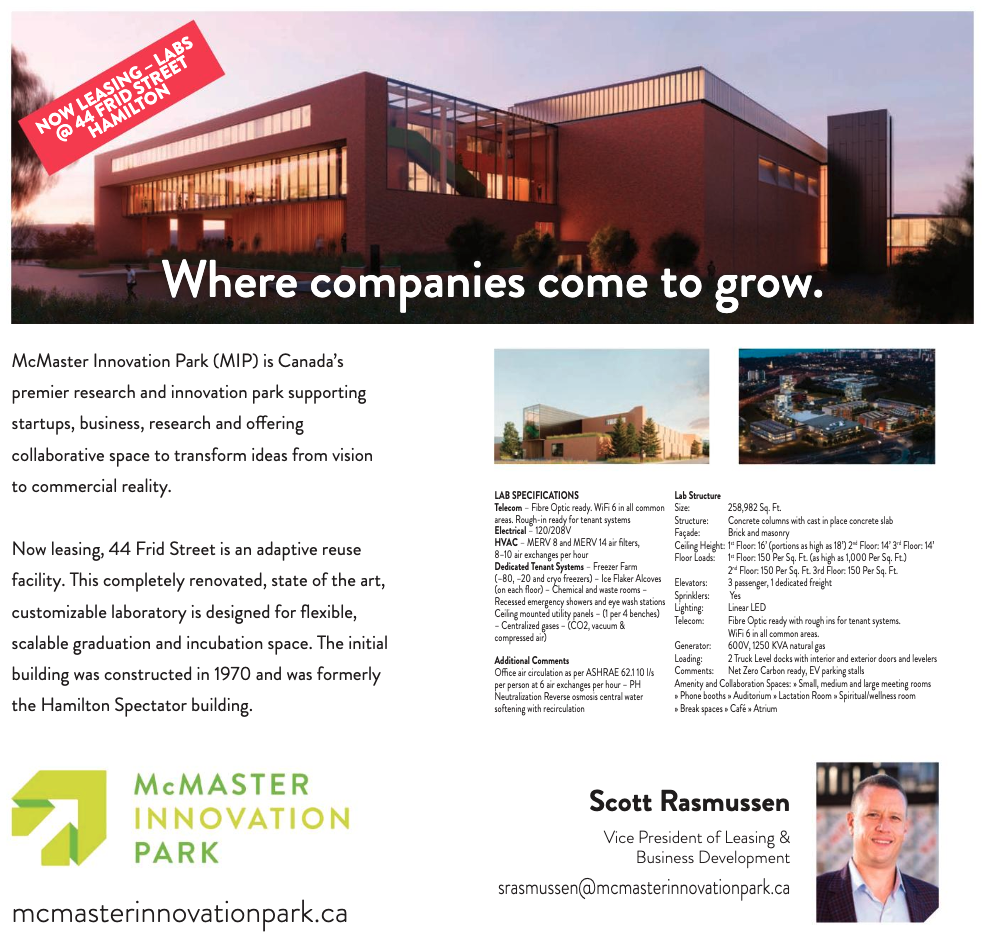McMaster Innovation Park (MIP) is in the midst of a $1.75-billion buildout that will grow its footprint by 2.8 million square feet and create an innovation continuum from fundamental research labs, to start-up spaces, to early-stage production facilities and full-scale biomanufacturing.
Located near McMaster University in Hamilton’s west end, MIP is leveraging the work of one of Canada’s top research universities and bringing local innovation to a global audience.
Hamilton has a strong ecosystem in life sciences and technology, which is magnified and accelerated through both the physical presence of MIP and its role in catalyzing relationships and collaborations, says Ty Shattuck, CEO of MIP.
“We know the power of collisions when it comes to innovation. When organizations with different skills and expertise and outlooks come together through collision, that creates successful collaborations. One of our roles is to facilitate collisions.”
A future in biomanufacturing
A priority at MIP is the establishment of production-scale biomanufacturing capabilities, such as the partnership with CCRM (Centre for Commercialization of Regenerative Medicine), will see the creation of a biomanufacturing campus at MIP to tackle chronic diseases such as cancer, heart disease, and diabetes.
Through the partnership, CCRM is expanding from its facilities in the MaRS Centre in Toronto by building an initial 100,000-square-foot facility at MIP to produce cells and viral vectors for clinical trials and commercial-scale manufacturing.
The mRNA COVID-19 vaccines demonstrate the need for domestic biomanufacturing, says Shattuck. They contain Canadian intellectual property but were manufactured elsewhere, sacrificing both self-sufficiency and job creation.
Also coming to MIP is McMaster’s Global Nexus for Pandemics and Biological Threats, which brings together international researchers from multiple disciplines to improve detection, management and treatments.
Acting locally, looking globally
Marrying a new product or technology with a novel business model requires a global outlook, says Shattuck.
“The odds that a perfect partner, collaborator or investor will be in Hamilton are infinitesimally small. We have to take the building blocks of research, innovation, market development and capital and assemble them into a whole. Producing globally relevant innovations out of the university or our hospitals requires pieces from all over, whether that’s Vancouver or Singapore, Boston or Dubai.”
Next year, MIP will join Toronto’s MaRS Discovery District and Waterloo’s David Johnston Research + Technology Park in hosting the Association of University Research Parks (AURP) International Conference. It will showcase southern Ontario and Canada as leaders in innovation.
“Today, entrepreneurs, leading global companies and investors increasingly see the Toronto-Waterloo-Hamilton region as a global-calibre life sciences corridor,” said Shattuck.
MIP has also established strong connections to communities of Canadians abroad, including Canadian Entrepreneurs in New England, with an eye to developing partnerships to help local ventures grow.
“Ex-pats are very passionate and proud Canadians who want to help fellow Canadians to succeed. Many had to leave Canada to pursue their careers or commercial ambitions and they want to contribute to an environment for success back home.”
Continuum of capital
MIP is the driving force behind the 2021 launch of the North American Life Sciences Capital Market Advisory Council. Its goal is to see more Canadian companies backed by Canadian investors.
“Capital investment is the lifeblood of companies, but the reality is that accessibility is fragmented and siloed,” said Shattuck. “Our research shows that Canadian ventures find pre-seed and seed funding at home and about half of their Series A investment. After that, they have to go abroad.”
That means job creation, along with returns and exit value – which can then be re-invested into next-generation start-ups – are realized elsewhere.
“The advisory council will take a national approach to creating a holistic capital market that will ensure Canadian companies get the funding they need to ensure success.”
To learn more about MIP please visit www.mcmasterinnovationpark.ca

















